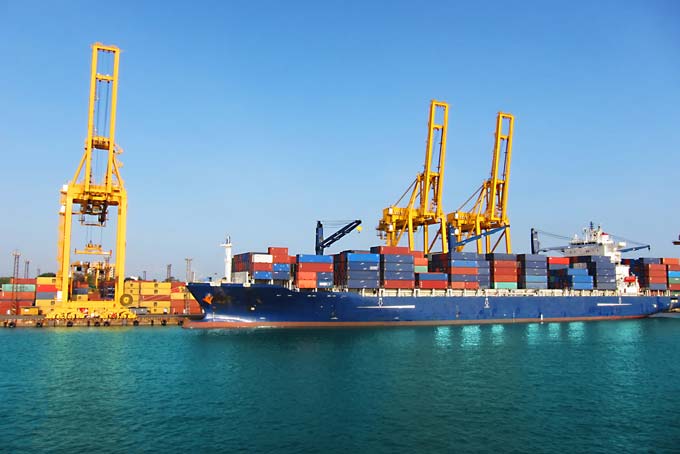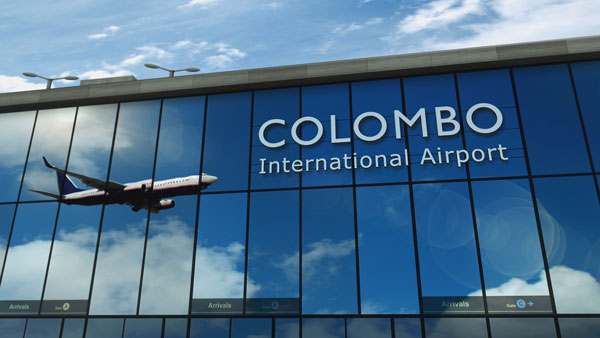UK/Sri Lanka Shipping Rates 2024
UK ⇆ Sri LankaGet Shipping Quote
Sea Freight
Commercial shipping
We offer bespoke prices and contract rates based on your consignment’s volume and regularity. We help you to understand your business needs and offer you a rate and service that suits your business.
Please feel free to contact us and discuss your commercial shipping needs:
Direct line:
020 8867 0904 option 1.
Direct email:
[email protected]

FCL Container Rates
| Sri Lanka | 20ft container | 40ft container |
| Colombo port | £2500.00 | £321.00 |
LCL Container Rates
LCL shipping from our London office in Feltham TW14 post code to Sri Lanka ports
| Total Volume * | Colombo port |
| 1 CBM | £268.00 |
| 5 CBM | £841.00 |
| 10 CBM | £1501.00 |
| Destination | 50 kilos | 200 kilos | 500 kilos |
| Colombo port | £268.00 | £459.00 | £698.00 |
Air Freight

- Delivery of cargo can vary from 3 - 7 working days form Door to airport
- London Heathrow Airport - Colombo (CMB)
| Destination | 50 kilos | 200 kilos | 500 kilos |
| Colombo (CMB) | £231.00 | £402.00 | £765.00 |
* For an accurate price, please use our online quotation form above and provide detailed information about your shipment requirement to Sri Lanka.
Sri Lanka UK Shipping Questions?
- Submit the form in this page or WECHAT id: dfs-Betty

- Or call +44 20 8867 0904 & ask for our commercial logistics specialist.

Exporting to Sri Lanka
Doing business in Sri Lanka: Sri Lanka trade and export guide
1. Sri Lanka export overview
Sri Lanka is a trading and a trans-shipment hub for south Asia.
Sri Lanka’s Gross Domestic Product (GDP) grew by 7.4% during 2014, up slightly from 7.2% in 2013. It is classed by the World Bank as a lower middle income country with a GDP per capita of $3,558 (2014 World Bank estimate). The government aims to increase this to $4,000 per capita by 2016.
Sri Lanka is a market of 21 million people. With its geographical location in south Asia it can reach a market of over 1.6 billion.
Sri Lanka has an established and growing middle class. Much of the middle class has a direct link with the UK through work, study or though family members in the UK. UK products are therefore familiar.
Sri Lanka is already home to some of the big UK companies. They include Marks and Spencer Clothing, HSBC, De La Rue Currency, GlaxoSmithKline, Standard Chartered Bank and Rolls Royce. There are over 100 companies in Sri Lanka with UK affiliation across a wide range of sectors.
Benefits for UK businesses exporting to Sri Lanka include:
- English widely spoken
- strong historical and trading links with the UK
- commercial law based on English law
- highest rated in south Asia in World Bank’s Ease of Doing Business ranking
- gateway country to Indian market via a Free Trade Agreement
Strengths of the Sri Lankan market include:
- high performing economy
- highly skilled and educated workforce
- logistical hub for south Asian region
2. Challenges
Bureaucracy, nepotism and a lack of transparency are all prominent in the Sri Lankan business environment.
Sri Lanka was ranked 85th in Transparency International’s Corruption Perceptions Index for 2014.
Read the Foreign and Commonwealth Office’s (FCO) Overseas Business Risk guide for Sri Lanka.
3. Growth potential
3.1 Economic GrowthSri Lanka’s economy is one of the fastest growing in the region with 7.4% growth in 2014. The economy is expected to grow by 6.9% in 2015.
However, government debt has been increasing and debt reduction is proving difficult to achieve due to low revenue. In 2014 the deficit stood at 6% of GDP. Sri Lanka’s short term debt is equivalent to over half of its foreign reserves.
3.2 Free trade agreementsSri Lanka has Free Trade Agreements (FTA) with India, Bangladesh and Pakistan which can reduce import tariffs into those countries. It does not apply to all goods and services.
Sri Lanka is also expected to finalise a FTA with China.
4. UK and Sri Lanka trade
Links between both countries have always been strong and Britain is a top 10 investor in Sri Lanka.
UK exports to Sri Lanka were valued at £165 million in 2014. This is a decline of 1% compared to 2013.
The UK’s top exports are:
- education
- infrastructure services
- Information and Communications Technology (ICT)
- financial services
The UK is:
- the leading business partner for higher education and professional training
- the preferred option for latest technology partnerships
- strong in sectors where Sri Lanka requires expertise and specialist equipment
5. Opportunities for UK businesses in Sri Lanka
5.1 Education and trainingGovernment policy aims to create more knowledge based jobs by:
- attracting foreign universities to set up branch campuses
- attracting foreign students to the country
- improving Information Technology (IT) literacy and internet access
British qualifications are the most desired. There are already 28 UK universities present in the market, working with local providers on undergraduate and postgraduate qualifications.
There are opportunities in vocational and further education, including skills training for the tourism sector. UK colleges are currently exploring the market.
Sri Lanka has the largest membership outside the UK of the:
- Chartered Institute of Management Accountants (CIMA)
- Chartered Institute of Marketing (CIM)
There are opportunities to:
- supply study materials/tools and classroom aides
- set up educational publishing/printing/software development offices
Much of Sri Lanka’s infrastructure needs to be modernised following destruction in the civil war as well as to drive further economic growth.
Government policy is to increase tourism related earnings to reach over $3 billion by 2016.
Opportunities include:
- roads and bridges
- water distribution and wastewater management
- port and airport development
- tourism infrastructure, including hotel expansion
The Sri Lankan government aims to develop:
- oil exploration and production
- oil trade related ancillary services including gas
- renewable energy sources
Sri Lanka has little experience in renewable energy. This creates opportunities related to the maintenance and running of renewable energy plants. These include:
- consultancy
- analytical services
There is also potential for UK companies in:
- food and drink where there is interest and demand for British products, but hardly any available in the market
- Information and Communications Technology (ICT)
- manufacturing
- Business Process Outsourcing (BPO)
- commercial services
British companies have found Sri Lanka to be a useful base for their new development operations by:
- buying into well performing Sri Lankan ICT companies
- setting up branch offices
The government is keen to establish Sri Lanka as a centre for the provision of:
- commercial services
- international banking
- international investment
This objective and the expected growth in port services and tourism provides opportunities for UK businesses in these sectors.
6. Start up considerations
Routes to market include:
- setting up a company, branch or franchise
- establishing a partnership
- appointment of agents/distributors
The Central Bank of Sri Lanka’s has a Step-by-step Guide to Doing Business in Sri Lankafor information on setting up a company in Sri Lanka.
The Department of the Registrar of Companies is responsible for incorporating companies.
Tax and legal obligations differ depending on which business structure you choose. DITSri Lanka can provide lists of lawyers and accountants on request.
The Board of Investment of Sri Lanka (BOI) can assist in establishing a company. Depending on the level of investment the BOI is able to offer tax incentives and holidays.
There are no special laws governing the contractual appointments of Sri Lankan agents by foreign principals.
7. Legal considerations
The laws and the court system in Sri Lanka are based on English Law.
Roman Dutch Law or local laws such as Kandyan Law or Thesavalamai Law can apply for property and inheritance.
7.1 Standards and technical regulationsThe Sri Lanka Standards Institution (SLSI) is the national standards body of Sri Lanka. It is a member of the International Organization for Standardisation (ISO)
Consumer goods exported to Sri Lanka must indicate the Maximum Retail Price (MRP).
Food items must be labelled in English, Sinhala and Tamil.
Prior approval for labelling and packaging should be obtained from the Cosmetics, Devices and Drugs Authority and SLSI.
7.2 Intellectual property (IP)Sri Lanka IP law recognises the following forms of intellectual property:
- industrial design
- patents
- trade marks
- copyright
- layout designs of integrated circuits
It is recommended that companies register IP with the National Intellectual Property Office to protect against infringement.
8. Tax and customs considerations
Sri Lanka’s tax structure for businesses can be complex so accountancy advice is essential.
Once you’ve completed a company registration contact the Department of Inland Revenue for:
- a Value Added Tax (VAT) number
- a Tax Identification Number (TIN)
- information on other taxes and rates
The BOI can grant exemptions from laws such as inland revenue, exchange control and customs if a project meets certain investment thresholds.
8.1 Value Added Tax (VAT)The VAT rate is 12%.
You can find more information on VAT in the Central Bank of Sri Lanka’s Step-by-step Guide to Doing Business in Sri Lanka.
8.2 Corporate and income taxYou can find details of corporate taxation in the Central Bank of Sri Lanka’s Step-by-step Guide to Doing Business in Sri Lanka.
Employee related taxes include:
- Pay As You Earn (PAYE)
- Employees Provident Fund (EPF)
- Employees’ Trust Fund (ETF).
The Sri Lanka Customs authority provides details of customs regulations and procedures.
9. Business behaviour
Sri Lankan business people generally speak English.
Occasionally women or men may prefer not to shake hands with the opposite sex. You should wait and see if a hand is offered.
